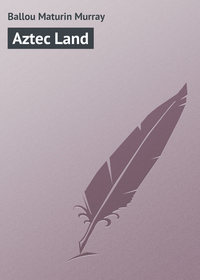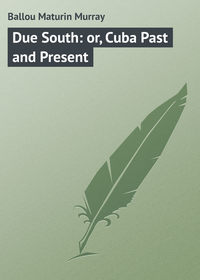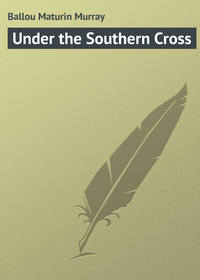 полная версия
полная версияDue West: or, Round the World in Ten Months

Ballou Maturin Murray
Due West; Or, Round the World in Ten Months
Plus je vis l'étranger, plus j'aimai ma patrie.
De BelloyPREFACE
To circumnavigate the globe in our day is only a question of time and money, the facilities being ample, and the inducements abundant. Intelligently and successfully to consummate such a purpose is an education in itself. The tourist will find all previous study enhanced in value by ocular demonstration, which imparts life and warmth to the cold facts of the chroniclers, besides which a vast store-house of positive information is created which time cannot exhaust. Perhaps the majority of travelers see only that which comes clearly before them; but this they do most faithfully, being possessed of a stronger sense of duty than of imagination. The clear, direct vision of such people has its merit. There are others who both see and feel, to whom the simplest object in its suggestiveness may be full of beauty. It is the latter who pluck delightful mysteries out of travel; and who, after viewing nature, it may be in her calmest moods, bring away with them upon the tablets of memory a Claude Lorraine. The eyes will operate automatically, but it is of little avail unless one exercises the observing power; then they become luminous. You will find poetry nowhere unless you bring some with you, says Joubert. If the author succeeds in imparting to the reader but a share of the great and varied pleasure he realized in the ten months of travel herein recorded, his object in transcribing these experiences will have been fully consummated.
M. M. B.CHAPTER I
Synopsis of the Journey. – Crossing the Continent. – A Great Midland City. – Utah and the Mormons. – The Sierra Nevada. – San Francisco. – A Herd of Sea-Lions. – Possibilities of California. – The Love of Flowers. – Public School System. – Excursion to the Yosemite. – An Indian Stronghold. – Description of the Valley. – Passage of the Mountains. – Caught in a Snow-Storm. – A Forest of Feathers. – The Mammoth Trees of California. – Passing the Golden Gate. – Voyage across the Pacific. – A Lost Day.
On the morning of September 16, 1882, four individuals, two of whom were ladies and two gentlemen, comparative strangers to each other, met at the Fitchburg depot in Boston, drawn together by the common purpose of a trip round the world. Adding the conductor, Mr. Gno. Dattari, an intelligent and experienced courier, the little party numbered five persons. The latter individual is attached to the traveling agency of Thomas Cook & Son, London, the house undertaking, for the sum of two thousand dollars each, to pay all transportation and board bills in accordance with a very comprehensive itinerary. This embraced the passage across the continent of America and the Pacific Ocean to Japan, with a month of residence and travel in that country; thence to China and up the Pearl River to Canton; a week in Hong Kong; a thousand-mile voyage down the China Sea to the chief ports of the Malacca Straits; across the Indian Ocean to the Island of Ceylon, with a week for excursions therein; thence to India, with a liberal exploration of its principal cities, including a visit to the Himalayas in the extreme north; through the Sea of Arabia, the Straits of Babelmandeb, and the Red Sea to Egypt, Cairo, and Alexandria; through the Suez Canal and the Mediterranean to Italy, Malta, Gibraltar, France, and England. A reasonable length of time was allowed for each section of the route, including a voyage across the Atlantic to the starting-point.
Any divergence from the prescribed route was to be at an additional charge, according to expenses incurred. The money was paid at the outset, and the agreement on both sides fulfilled to the entire satisfaction of all concerned. Thus much it has seemed well to premise for the information of the reader who proposes to follow our course due west, as presented in these pen-and-ink sketches of many lands. It should also be mentioned that the season of the year had been judiciously chosen, so as to bring us into each country at the most favorable period for its healthful and agreeable enjoyment, a calculation which is imperative for any one contemplating a journey of this character. Otherwise, the intense heat of the tropics, as well as the Arctic chills of the north, may render such a trip a hardship rather than a season of pleasure.
The first day's experience served to acquaint the little party with each other, and no possible association can effect this so rapidly as traveling together, where individuals necessarily become inseparable, and where fixed traits of character must inevitably exhibit themselves. Mr. M – and his daughter, as also the author of these notes, were Bostonians; the fourth person being a Miss D – , of Yorkshire, England, who came hither to make the long circuit of the globe. Even American parlor-cars, which embrace as much of domestic comfort as is compatible with their legitimate purpose, could not prevent our being somewhat fatigued by an unbroken journey of over five hundred miles, when we reached Niagara Falls at two o'clock in the morning. And yet the day seemed short by reason of the varied and beautiful scenery of the Hoosac Tunnel route, particularly in the region of the Deerfield Valley, and also west of the Massachusetts state line. The abundant foliage was in its autumnal prime, not yet having been touched by the wand of the Frost King, while the teeming fields gave evidence both of fertility of soil and skilled cultivation. The neat farm-houses were ornamented by creeping vines, and tiny flower-gardens in their fronts. Tall conical haystacks flanked the spacious, well-filled barns; big yellow pumpkins dotted the half-cleared cornfields; and handsome groups of cattle quietly ruminated in the pastures. A picturesque line of beehives, half a dozen happy children at play before the house door, and the sturdy master of the thrifty scene, leaning over the fence to exchange pleasant words with a passing neighbor on horseback, were frequent rural pictures, which were afterwards contrasted with those of other countries.
A quiet Sabbath was passed at the Clifton House, on the Canada side, where an excellent opportunity is afforded for viewing the falls in their various aspects. It was a still, clear day, bright and sunny. A column of vapor rose many hundred feet above the falls, white as snow where it was absorbed into the skies, and iridescent at the base, which was wreathed in ceaseless rainbows. A practical eye could not fail to observe that a portion of the enormous force here running to waste has been utilized by means of a canal, dug from a point above the falls to a plateau two miles below them, whereby some large grist-mills and paper-manufacturing establishments are operated with never-failing power. The usual round of sightseeing was performed on the following day. When we remember that there is conclusive evidence of these falls having been at a former period fully six miles nearer to Lake Ontario, and consequently that there is a daily though infinitesimal wear going on, it leads one to speculate as to what will be the probable result when the great falls shall have receded so far as to open, at one terrific plunge, the eastern end of Lake Erie.
Another day and night in the cars over the Great Western and Michigan Railroad brought us to Chicago. Fifty years ago only a scattered tribe of the Pottawatomies inhabited this spot on the shore of Lake Michigan, where is now located the most important capital of the Northwestern States. The commercial growth of Chicago is the natural sequence of its situation at the head of the great chain of lakes, which form a medium of unequaled inland navigation, supplemented by a railroad system of nearly a score of trunk lines which centre within its limits. A drive about the town served to impress us with a due appreciation of its business enterprise and rapid growth in all the departments of education and of art, which characterize a prosperous American community; especially was a spirit of intense activity observable, entering into every element of trade and business. The private houses of wealthy merchants adorn the environs, while Lincoln and South Park, lying on either side of the city, rival anything of the kind in Europe or America. Chicago is the natural centre of the grain trade of our continent, and we had almost said of the food-supply of the world, a statement exemplified in the fact that, during the last year, one hundred and fifty millions of bushels of grain passed through its elevators.
The next objective point was Salt Lake City, the distance being over sixteen hundred miles, to accomplish which we passed four days and nights in sleeping-cars. Two days' rest at this point afforded an opportunity to look about us, and to gather some information touching the singular people who make it their home. The capital of Utah, so well chosen for its special purpose, was an unbroken wilderness forty years ago, but can now boast a population of twenty-five thousand. Under the hands of its present occupants, the whole surrounding valley has been cultivated to a degree of fertility scarcely equaled by the same number of square miles on the continent. The city proper is laid out in broad streets intersecting each other at right angles, and which are bordered with cottonwood trees, forming a pleasant shade; while in every gutter a stream of water runs swiftly along, with a rippling sound, fresh from the neighboring mountains. Great attention has evidently been paid to sanitary matters, and everything looks neat and clean. The visible marvel of the city is the great Mormon temple, or Tabernacle, a building capable of holding and seating over twelve thousand people, the roof of which is self-supporting, and is believed to be the largest one of its character extant. The acoustic properties of this immense structure are also remarkably perfect, which was proven to us by some curious experiments. As to general effect, however, there is no more architectural character to the Mormon Tabernacle than to a prairie dog's hole. Its roof resembles nothing so much as a huge metallic dish cover, forming an awkward and prominent feature of the city.
It is not within our province to discuss in detail the peculiar and abhorrent domestic life of this people, no visible evidence of which meets the eye of the casual visitor; though in scanning the features of the large audience assembled in the Tabernacle on Sunday, the obvious want of intelligence in the faces of the women, compared with the men, was certainly striking. One seemed also to read a spirit of discontent or of calloused resignation in some of the better female countenances. Of the thrift, industry, and material success of this community there can be but one opinion. An important statistical item occurs to us in this connection which is highly significant. It appears that while Colorado and Kansas spend each one dollar and a tenth, and Nebraska two dollars and a tenth per head on the education of their school population, Utah expends but nine-tenths of a dollar for the same purpose. Upon inquiry it was discovered that polygamy did not at first form any part of the faith of Mormonism. The originator of the creed, Joseph Smith, never promulgated such doctrine, and possessed but one wife. The "celestial marriage" humbug was first preached by Brigham Young, in 1852, when he produced a document bearing the above title, pretending that it was revealed to Joseph Smith a year before his death. Smith's widow and son, both surviving, pronounced this to be a falsehood, a pure invention, but Young was too strongly seated in his chair of authority not to be able to carry his point. This "revelation" was incorporated into the Mormon faith by a meeting of the assembled deacons of the church, and has since become its most prominent feature. Mormon missionaries seek proselytes mostly in Brittany, Scandinavia, Denmark, and Wales, addressing themselves to the most ignorant classes. These poor, half-starved creatures are helped pecuniarily to emigrate, believing that they are coming to a land flowing with milk and honey. In most cases any change with them would be for the better; and so the ranks of Mormonism are numerically recruited, not from any religious impulse in the new disciples, but through the simple desire to better their physical condition in life. No portrait of Mormonism will prove to be a true likeness which does not depict its twofold features, its iniquity and its thrift. The conclusion forces itself upon the visitor that railroads and contact with the world will gradually obliterate the institution of polygamy.
Two days and one night of additional travel brought us to San Francisco, a distance of six hundred miles. We passed through the grandest portion of the Sierra Nevada Mountains between midnight and dawn, but the moon was near its full, and the sky radiant with starlight; so that, by placing seats upon the platform of the cars, a fine view of this remarkable passage was obtained, characterized by deep cañons, wild gorges, lofty wooded peaks, and precipitous declivities, under a most impressive aspect. A few specimens of native Indians were seen at Salt Lake City, who had come in from the hills to purchase trifles; but after leaving Ogden more or less of the Shoshones and Piute tribes were to be seen lounging in picturesque groups at nearly every railroad station. A few also traveled with us short distances in the baggage car, which is made free to them. The men were dirty, uncouth specimens of humanity, besmeared with yellow ochre and vermilion, dressed in red blankets, and bearing a hatchet in their hands, their only visible weapon. The women were dressed in tawdry colors, – striped government blankets and red flannel leggins, with a profusion of colored beads about their necks, and cheap jewelry on fingers and wrists; each one with an infant strapped in a flat basket to her back. They did not beg ostensibly, but were ready to receive trinkets, tobacco, pennies, or food. The women were very uncleanly in their appearance, their coarse long hair entirely uncared for, but they were good-natured and smiling, while the men wore a morose and frowning expression upon their countenances. War, whiskey, and exposure are gradually but surely blotting out the aborigines.
We were thus, without any special haste, but twelve days in crossing the American continent, from the Atlantic to the Pacific, on about the fortieth parallel of latitude, the trip having afforded us much quiet enjoyment and a great variety of bold and beautiful scenery, too near home and too familiar to our readers to dilate upon in these pages.
San Francisco, with its population of three hundred thousand, is a city of great commercial wealth, much architectural pretension, and progressive ideas, affording the traveler the best and cheapest hotel accommodations in the world. As is well known, it owes its early impetus to the discovery of gold in 1848, but the product of the precious metal has long since been exceeded more than tenfold in intrinsic value by the agricultural development of the great Pacific region, which finds its shipping point through the Golden Gate. Though California still produces and sends out into the world at large an average of two millions of gold each month, still the shining ore is but a secondary consideration in her productiveness, and is also surpassed by her export of wine and fruit. Men who came here with the gold fever, between twenty and thirty years ago, gradually recovered from their unwholesome Aladdin-like dreams, and settled down to reap from agriculture and legitimate business surer and more permanent fortunes. The population which sought its gains in wild and lawless adventure, characterized by all the objectionable features of rude pioneer life, has gradually given place to one of a more stable nature, governed by a respect for the laws and the wise conventionalities of society. There lies a brilliant future before this section of the country, which in grand possibilities defies calculation; it has passed through its baptism of fire, and, let it be hoped, has burned out the dross which is incident to the too rapid growth of large communities.
The territorial importance of California will be most readily presented by a statement of the facts that, if it lay on the Atlantic shore, it would extend from Massachusetts to South Carolina; that it is about five times as large as the combined New England States; and that it absolutely teems with gardens, vineyards, orange, apple, pear, and peach orchards, and vast grain fields. The climate presents most of the advantages of the tropics, with few of the drawbacks. Hot-houses for delicate plants are hardly needed in winter, and the fan-palm flourishes as it does at Singapore.
A visit to that part of San Francisco known as China Town revealed the fact that twenty thousand Chinese were here living in tenements which would be insufficient for three or four thousand Americans. They are clearly actuated by the same purpose as that indicated by the motto of the home Spaniard who leaves Madrid for Cuba: "Seven years of starvation and a fortune." The Chinaman hoards nearly all he receives, and in four or five years can return to his native land with a sum of money which, to him, is an assured independence. They are extremely unpopular with the citizens of all classes, and not without some good reasons, being naturally a filthy race, and in many ways specially offensive. It must not be understood that there are only Chinese washermen, laborers, and artisans in the city; there are also responsible merchants, brokers, and manufacturers belonging to that nationality, wielding considerable influence, both among their own people and the citizens at large. Every street in China Town has its joss-house or temple, and however low these Mongols are as a race, they never fail to give heed to their professed religion and its various forms. It is also a fact that crime is less frequent in China Town than it is in other parts of the city; and drunkenness, except insensibility from opium, is scarcely known among the Chinese in California.
Driving in and about the city, one is impressed by the manifest love of flowers exhibited in the front yards of the dwelling-houses, and in the pleasant gardens attached to suburban villas, as well as by the blooming plants displayed on the window-sills of the homes of all classes. The admirably chosen spot for a cemetery, on the rising ground behind the city, is also finely ornamented with choice trees and flowering shrubs, among which are pines, cypresses, Australian gum trees (evergreen), mimosas, and many other blooming plants, well arranged for good effect. The scarlet geranium here grows six and eight feet high, producing with its brilliant bloom a dazzling effect. The same drive which conducts to the cemetery, a little further on brought us to a most delightful public garden and park combined. Here were broad roads, as smooth and perfect as roads can be made; footpaths leading into inviting groves, beautiful lawns relieved by groups of graceful trees, lakes, and fountains, with several large ornamental conservatories for the most delicate exotics. The whole formed an exposition of landscape gardening of which any city might be proud.
A couple of miles beyond this noble park brought us to the Cliff House, a favorite resort of the people, situated on a high bluff of the Pacific coast and affording an ocean view only limited by the powers of the human vision. Looking due west, no land intervenes between this shore and the far-off coast of Japan, a distance of five thousand miles, which we were destined soon to traverse. Two hundred yards off the shore, just opposite the Cliff, a large rock rises from the sea some hundred feet or more, upon which scores of sea-lions come out of the water at all hours of the day to sun themselves, affording a very peculiar and amusing sight. They are of all sizes, weighing from fifty to one thousand pounds, some of the old ones even exceeding this estimate, yet possessing a muscular power which enables them easily to climb the rough side of the precipitous rock. The half roar, half bark of the herd comes with harsh discordance upon the ear of the listener at the Cliff. The law of the State protects these sea-lions from all sorts of molestation; so here they quarrel among themselves furiously, suckle their young, tumble into the sea, and thrive and multiply.
In many respects San Francisco resembles a New England capital, – a very natural result when we remember that a large percentage of her people are natives of these Eastern States. She has copied the Boston school system almost exactly, and there are few of our oldest cities so well organized in this department of progress, though the city is but little over twenty years of age, dating from the time when she first came prominently into public notice. Girls and boys are not only afforded the most excellent educational advantages, but a spirit of emulation is successfully fostered among them, especially encouraging to the observant visitor. There is a high school for boys and one for girls, also a Normal school for the education of teachers. San Francisco has from the outset established a fixed reputation, by employing and liberally compensating the best pulpit talent to be had in the country.
Finding that the steamship in which we were to sail for Japan would be detained for the period of ten days, it was resolved to improve the time by a visit to the Yosemite Valley, involving a journey, in the round trip, of over six hundred miles, a large portion of which is performed by coach. The time, trouble, and expense were, however, abundantly repaid by the experience gained among the wonderful developments of nature, as exhibited in Alpine scenery and the grandeur of forests which produce giant trees over three hundred feet in height and forty in diameter, and which are proven to be over thirteen centuries old. The cars took us to Madeira, a frontier station to which the broad grain fields of California already extend. From here, early next morning, we took a four-horse covered wagon to Coarse Gold Gulch to dine, and here we passed the night on our return, it being a ranch kept by a worthy German family. Though the accommodations were rather crude, ample satisfaction was assured by the cheerful service rendered and the cleanliness which characterized everything.
We reached Clark's Hotel, located at the foot of the mountains where the abrupt ascent begins, on the evening of the second day after leaving San Francisco. Early the next morning the journey was renewed, six horses now taking the place of four, which number, with frequent changes, had been quite sufficient on the previous day. The driver who now took us in charge was a large, fine specimen of the mulatto race, and certainly a very excellent whip, steady, and as strong as a Hercules. There are few positions which require more skill and vigilance than to safely drive a team of six horses and a coach full of passengers by the precipitous, winding road over the mountains intervening between Clark's and the level of the valley, to enter which a rise of over seven thousand feet must be achieved. Scarcely had we fairly commenced the upward climb, when it was observed that we had left all signs of human habitation behind; and soon even fences disappeared, except about the coach company's ranches, where we stopped to change horses, in groves of sugar pine and yellow pine trees of great size and beauty. Here we were literally surrounded by Nature, which some quaint writer denominates God's Old Testament.
An austere and almost mournful air of loneliness surrounded us, as we crept higher and higher towards that ethereal blue canopy which hung over the loftiest peaks. All was silence save the rumbling noise of our conveyance; and when, as was the case at a sudden angle of the winding road, a large black bear was seen coolly sitting on his haunches, with listless hanging paws, looking at the stage and its contents, it did not seem at all strange, but quite in keeping with the solitary surroundings, though some of our horses did exhibit a little restlessness. The pistol-like crack of the driver's whip was an intimation to Bruin which he understood, for he slowly dropped into the thick brush and rolled awkwardly away from the roadside. The eye was never weary in detecting the natural architecture of the mountain acclivities, which, in the constantly varying scenery, formed amphitheatres like old Roman circuses, and now square battlemented crags, like crumbling castles on the Rhine, and again a deep, shady ravine of unknown depth, where lonely mist-wreaths rested like snowdrifts. In the far background were cliffs like oriental minarets, and balled rocks capped like the dome of St. Peter's.









